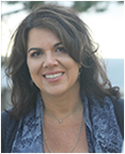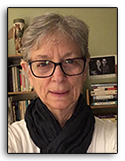

Elisabeth Crim, PhD
Connections! Chapter News
Natalie Jambazian
President's Message
Read
Ariel Cohen
Legislative Updates
Read
Madeline Taylor
January Membership
Meeting Write-Up
Read
Katie (Wren) Busse
Ethics Committee
Read
Member Columnists
Charlyne Gelt
Cinema Therapy
Marriage Story
Read
Contributors
Sue Cristol
Termination —
When to Let Go
Read
Rena Pollak
Are you Friends With An Easily Offended Person?
Read
Member Highlight
Shelley Horner
Read
Scholarships
Scholarship Recipients
Read
Alan Croft
Read
Katie Busse
Read
Shari Manculich
Read
Sponsors
Newport Academy
Read
Gregg Bruno Homes
Read
eBlasts
February 2020 eBlasts
Read
March 2020 eBlasts
Read
Contact Us
Read
January Membership Meeting Write-Up — Madeline Taylor, LMFT
Compassion Fatigue, Vicarious Trauma, and Mindful Self-Care
Presented by Elisabeth Crim, PhD
Okay . . . take a deep breath and slowly release it. Congratulations! You’ve just engaged in one of the most readily-available methods of mindful self-care.
On January 12, 2020, under the attuned eye of Dr. Elisabeth Crim, we were treated to an important discussion of compassion fatigue and were offered multiple opportunities to engage in mindful self-care. Dr. Crim is a licensed psychologist and certified Relax and Renew Yoga trainer. She has extensive expertise in the hazards, which can occur when those in the helping professions are exposed to the traumatic experiences of their clients.
While many of us unconsciously hold the ideal of ourselves as being able to “be there” for others, we are not trained equally in the art of self-awareness and self-care. Many therapists experience uncomfortable feelings when a client’s material reactivates something disturbing within them. This can be understood as counter-transference, co-transference, secondary trauma, or vicarious trauma.
The intersubjective field refers to the reciprocal influence, which patient and therapist have on one another. Trained in empathic attunement, providing the missing but needed listening function for our patients, we open a relational space where their most disturbing affects and experiences are permitted to arise and be expressed. We therapists help to make meaning of these experiences, feelings, and beliefs for and with our patients. As patient and therapist together make sense of the patient’s experiences, needs, affect states, etc., the patient is being provided the self-cohering experience of feeling deeply understood.
Dr. Crim reminded us that in providing this relational safety for a patient, we are likely to hear the very things the patient hasn’t been able to tell anyone else. These can be shocking and disturbing events. Hearing these stories and identifying with our patients can reactivate unpleasant memories from our own lives.
In moments when we are reactivated, and just because of the accumulation of providing care for others, Dr. Crim helped us remember that we all need secure relationships in our lives outside of our relationships with patients. We need teachers, supervisors, friends, family, therapists of our own, and practices, which are calming or stimulating in a way that meets our unique inclinations. The most important function we can offer ourselves is to be attuned to our own feelings and needs and to take care to get these needs met.
This was joyously modeled when Dr. Crim asked us to look outside . . . it was a particularly clear and beautiful morning. She asked us if we’d rather be outside and after a moment of hesitation, (Is it okay to interrupt the presenter and acknowledge a desire to be elsewhere?) we said, Yes! She led us, duckling-style, out the door and into the beautiful sunshiny morning where we attended to our instincts and did whatever we wanted to do. So liberating!
We walked amidst the park-like environment of the country club; sat in the sun and meditated with eyes closed; chatted and interacted with one another; in short, we paid attention to our moment-to-moment desires with the blessing and encouragement of Dr. Crim. The point, of course, was to do so mindfully. The extensive and thorough PowerPoint presentation couldn’t have mattered more than the experience of Dr. Crim following up on a feeling she had and a feeling she sensed in the room. The experience of her feeling okay to interrupt her own presentation because something didn’t feel right to her, was the essence of the presentation, itself.
Thank you, Dr. Crim! We’ll remember this!
 Madeline Taylor, PhD, LMFT, has been in practice for 40 years. She is associated with the Institute of Contemporary Psychoanalysis and has taught attachment theory, self-psychology, and intersubjectivity theory for 30 years. She has offices in Santa Monica and Calabasas, seeing adolescents, adults, and couples. “Nothing is as powerful as human understanding.” (George Atwood)
Madeline Taylor, PhD, LMFT, has been in practice for 40 years. She is associated with the Institute of Contemporary Psychoanalysis and has taught attachment theory, self-psychology, and intersubjectivity theory for 30 years. She has offices in Santa Monica and Calabasas, seeing adolescents, adults, and couples. “Nothing is as powerful as human understanding.” (George Atwood)